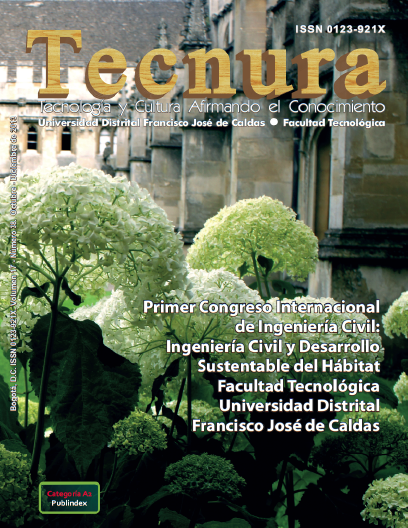DOI:
https://doi.org/10.14483/22487638.6924Published:
2013-09-18Issue:
Vol. 17 No. 38 (2013): October - DecemberSection:
EditorialEditorial
Downloads
How to Cite
APA
ACM
ACS
ABNT
Chicago
Harvard
IEEE
MLA
Turabian
Vancouver
Download Citation
Editorial
This Tecnura journal supplement contains the main papers presented at the first Civil Engineer international congress titled: CIVIL ENGINEERING AND SUSTAINABLE DEVELOPMENT OF HABITAT.
Civil Engineering has been linked to the development of Colombia for the last 150 years. The creation of the military school in 1861 marked the beginning of the training of engineers in Colombia. A few years later, the military school joined the newly formed National University of Colombia to form the School of Engineering. Since then, civil engineering has had a massive impact on the social, economical and environmental aspects of the country.
The emergence of the concept of sustainable development in the 1980s, highlighted the need to achieve social and economic progress involving environmental variables in all economic activities. In 1987, the initial term sustainable development emerged from the results of the work of environment and development from the commission of the United Nations (UN). This commission was also called Bruntland. This concept raises the dangers of conceiving economic growth without addressing the biological boundaries of the planet and the environmental variables. Therefore, the main implication in use this concept is to meet the natural environment needs of the present without affecting the future. This concept has been adopted as a determinant of the development model for many countries including Colombia, where the Colombian state is the guarantor of efficient and rational management of environmental goods and services. It is also, one of the major public policy challenges that fundamentally impact on the economy and transcends other aspects of national life as social and political.
The practice of Civil Engineering has not been immune to this new paradigm in the world and their actions had environmental implications in different aspects such as infrastructure, transport and pipes that usually are involved in major earthworks and materials that may have important implications. In short, some of the work of civil engineering can generate great controversy from the environmental point of view. However, it is important to note that the final decision on the execution of these works usually comes from the political and territorial organization, which decided on different aspects such as general infrastructure, modal choice, and public investment criteria etc. On the other hand, mainly the Civil Engineering activity directly contributes to solving environmental problems related to water purification and sewage treatment, handling and disposal of waste, construction equipments and environmental recovery works among others. Additionally, it has contributed to establishing a clear framework, from the point of view of the definition of policies, plans and programs, such as the implementation of sustainable development strategies, which has opened new felds of action in its professional work.
As a consequence of all these considerations, when the Francisco Jose Caldas Distrital University was asked about the possibility of this Congress to be included in the Curriculum Council, there was a high agreement between University members of the need to organize this event. The initiative of this Congress was supported by the principle members of the Faculty of Technology and the cooperation of the School of Military Engineers, where the congress took place from the 10th to 12th of December 2012. The event was attended by a large number of national and international speakers, who presented their work in important areas such as mobility, use of materials, health and environment, development and technological applications among others. Overall, around two hundred people attended to this Congress. Thank you to all these people.
César Augusto García Ubaque
Research Unit Director Technological Studies Faculty
Universidad Distrital Francisco José de Caldas
License
Esta licencia permite a otros remezclar, adaptar y desarrollar su trabajo incluso con fines comerciales, siempre que le den crédito y concedan licencias para sus nuevas creaciones bajo los mismos términos. Esta licencia a menudo se compara con las licencias de software libre y de código abierto “copyleft”. Todos los trabajos nuevos basados en el tuyo tendrán la misma licencia, por lo que cualquier derivado también permitirá el uso comercial. Esta es la licencia utilizada por Wikipedia y se recomienda para materiales que se beneficiarían al incorporar contenido de Wikipedia y proyectos con licencias similares.


